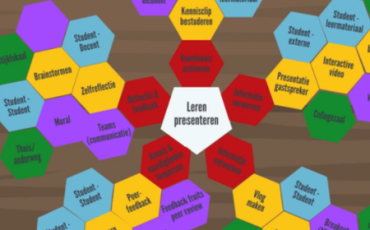Deze maand: De impact van AI op blended learning – ervaringen van docenten in Zuid-Afrika
Sanders, D. A., & Mukhari, S. S. (2024). Lecturers’ perceptions of the influence of AI on a blended learning approach in a South African higher education institution. Discover Education, 3, 135. https://doi.org/10.1007/s44217-024-00235-2
Tanja Beks heeft dit artikel voor je uitgekozen. Zij werkt als onderwijskundige bij de Breda University of Applied Sciences (BUAS). Daar ondersteunt ze academies instellingsbreed, biedt expertise in het AI-programma en werkt ze samen met het Exam Centre om de toetskwaliteit te borgen.
Wat je in dit artikel leest
De ervaringen en inzichten van Zuid-Afrikaanse docenten over de integratie van AI binnen blended learning staan in dit artikel centraal. De auteurs keken niet alleen naar de kwalitatieve gegevens van focusgroepinterviews, maar analyseerden ook cursusmateriaal en onderwijsmethoden. Op die manier hebben zij onderzoek gedaan naar zowel de voordelen als de uitdagingen van AI in blended leeromgevingen. De onderzoekers gebruikten het Substitution, Augmentation, Modification, and Redefinition (SAMR) -model als theoretisch kader om de impact van AI op blended learning te analyseren.
Goed georganiseerde technische ondersteuning, training en tijdsinvestering om AI effectief in te zetten is noodzakelijk, zo benadrukt deze studie. De bevindingen onderstrepen dat AI kan bijdragen aan gepersonaliseerd leren. Maar daar staat tegenover dat het voor een succesvolle implementatie nodig is om technische en ethische uitdagingen (zoals privacykwesties) aan te pakken.
Waarom we dit artikel hebben geselecteerd
Hoe kun je AI integreren in blended learning omgevingen in het hoger onderwijs? Dit artikel biedt daartoe belangrijke inzichten voor onderwijsprofessionals. Het benadrukt niet alleen de voordelen van AI, zoals gepersonaliseerde feedback en flexibiliteit, maar bespreekt ook belangrijke uitdagingen, zoals technologische ondersteuning en ethische kwesties rondom data. De publicatie is daarom waardevol voor onderwijsinstellingen die AI willen implementeren, omdat deze helpt om de nodige randvoorwaarden en valkuilen beter te begrijpen. Voor docenten en opleiders biedt dit artikel handvatten om AI effectief in te zetten en de leerervaring voor studenten te verrijken.
Hoe sluit dit aan op je onderwijspraktijk?
Welke institutionele steun en trainingen zijn er nodig om een succesvolle implementatie van AI in blended leeromgevingen te waarborgen bij jouw onderwijsinstelling?
Kennis over blended learning opdoen
De Special Interest Group (SIG) Blended Learning en de Vraagbaak Online Onderwijs hebben de handen ineen geslagen. Elke maand selecteren deze twee SURF-communities speciaal voor jou een relevant wetenschappelijk artikel over blended learning dat interessant is om te lezen. We stellen je een prikkelende vraag en we stimuleren je om naar je onderwijs / omgeving te kijken en je kennis en ervaring te delen. We vinden het geweldig als je jouw antwoord hieronder of op LinkedIn met ons wil delen!
Eerder verschenen in deze serie:
- Deel 1: Docentstrategieën voor betrokkenheid.
- Deel 2: Peerfeedback bij blended learning.
- Deel 3: De effectiviteit van blended learning meten.
- Deel 4: Gevoel van leren bij actief leren.
- Deel 5: Professionalisering bij blended learning.
- Deel 6: Blended learning als leermodel.
- Deel 7: Het belang van face-to-face onderwijs bij blended learning.
- Deel 8: Het TPACK-model als kader en ontwerpmodel.
- Deel 9: Het studentenperspectief op leren in een actieve en blended onderwijscontext.
- Deel 10: Gepersonaliseerd leren in blended leeromgevingen.
- Deel 11: Hoe studenten meer regie nemen in hun leerervaring.
- Deel 12: De rol van onderwijseigenschappen bij het voorspellen van academisch succes.
- Deel 13: Studiesucces verhogen met peer-learning zelfregulatiestrategieën.
- Deel 14: Blended Learning ontwerpprincipes voor onderwijs gericht op duurzaamheid.
- Deel 15: Flexibeler, toegankelijker onderwijs door minder on-campus en meer online tijd.
- Deel 16: Blended learning, strategische visie en behoeften van de onderwijspraktijk.
- Deel 17: Blended learning, Learning Analytics en formatief handelen.
- Deel 18: Effectief blended learning ontwerp voor betere studentprestaties en beter welzijn.
- Deel 19: AI in Blended Learning, een brug naar effectiever onderwijs.
- Deel 20: Didactiek eerst, of technologie eerst?
- Deel 21: Het effect van keuzevrijheid in de combinatie van traditioneel en online onderwijs
The science behind Blended Learning | Part 22: Lecturers’ perspectives on the impact of artificial intelligence in blended learning
Sanders, D. A., & Mukhari, S. S. (2024). Lecturers’ perceptions of the influence of AI on a blended learning approach in a South African higher education institution. Discover Education, 3, 135. https://doi.org/10.1007/s44217-024-00235-2
Tanja Beks selected this month's article. She works as an education specialist at Breda University of Applied Sciences (BUAS). She supports the academies institution-wide, provides expertise in the AI programme and works with the Examination Centre to ensure assessment quality.
What to expect in this article
This article explores lecturers’ perspectives on the impact artificial intelligence (AI) has on blended learning within the context of South African higher education. The authors included qualitative data from focus group interviews in their research as well as analyses of course materials and teaching methods. They researched both the benefits and challenges of AI in blended learning environments. The authors used the Substitution, Augmentation, Modification, and Redefinition (SAMR) model as a theoretical framework to analyse the impact of AI on blended learning. The study highlights the need for well-organised technical support, training and time investment to use AI effectively. The findings underline that AI can contribute to personalised learning, but that successful implementation requires addressing technical and ethical challenges, such as privacy issues.
Why we think this article is a must-read
This article offers important insights for education professionals on how to integrate AI into blended learning environments in higher education. It not only highlights the benefits of AI, such as personalised feedback and flexibility, but also discusses key challenges regarding technological support and ethical issues around data. The publication is therefore valuable for educational institutions looking to implement AI, as it helps to better understand the necessary prerequisites and pitfalls. For lecturers and educators, the article provides guidance on how to use AI effectively and enrich the learning experience for students.
How does this align with your teaching practice?
What institutional training is required to ensure the successful implementation of AI in blended learning environments in your organisation?
Gaining more scientific knowledge on blended learning
SURF’s Special Interest Group (SIG) Blended Learning and Vraagbaak Online Onderwijs will be working together from now on. Each month they will provide you with a relevant article on blended learning and an inspiring question. Easy, accessible and up to date. We invite you to share your thoughts on the selected articles either here or on LinkedIn.
Previous articles in this series:
- Part 1: Strategies to foster student engagement
- Part 2: Peer feedback in a Blended Learning environment
- Part 3: Evaluating the effectiveness of blended learning.
- Part 4: Measuring actual learning versus feeling of learning.
- Part 5: Professional development for Blended Learning.
- Part 6: Blended learning as an instructional model in vocational education.
- Part 7: How face to face activities impact the effect of Blended Learning.
- Part 8: The TPACK and Multimodal model as framework for designing and implementing blended learning.
- Part 9: Student perspectives on learning experiences in a higher education active blended learning context.
- Part 10: Personalized learning in higher education settings.
- Part 11: How students take more direction in their learning experience.
- Part 12: Students matter the most in learning analytics. The effects of internal and instructional conditions in predicting academic success.
- Part 13: Increasing study success using peer-learning self-regulation strategies.
- Part 14: Developing Design Principles for Sustainability-Oriented Blended Learning in Higher Education.
- Part 15: Well-designed blended learning with half of the study time online, yields comparable learning outcomes to on-campus education.
- Part 16: Blended Learning, strategic vision, and needs of educational practice.
- Part 17: Supporting students’ basic psychological needs and satisfaction in a blended learning environment through learning analytics.
- Part 18: Effective design of blended learning to increase student performance and improve well-being.
- Part 19: AI in Blended Learning, the bridge to more effective education.
- Part 20: Didactics first, technology second?
- Part 21: A combination of lectures, interactive workshops, and online resources improved student engagement.
Foto door Neenu Vimalkumar via Unsplash



0 Praat mee